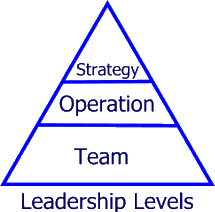
There have literally thousands of books written on this subject, and whilst it is always useful to learn from others, leadership is a factor of much more than theories. Each person has to find a way of leading that is congruent with who they are, so it comes over as authentic. However, I felt it might be helpful to summarise some of the more important ideas about leadership in one place.
In the last 60 years there has been a revolution in Leadership from ‘Command & Control’ to ‘Business Leadership’. A great deal of money being invested in this by both government and NGOs. The change in the understanding of leadership is as significant as the fall of communism. Change is at the root of it.

John Adair, of University of Surrey & Sandhurst, described three levels of leadership
Leadership is required at all levels of an organisation, and teamwork is required to bind the teams together.
A leader needs to :-
As a leader moves up this pyramid, they need to also:-
An interesting question to ponder is “Why is it that one person is accepted as a leader in a group (and not someone else)?"
A Leader needs the following qualities:-

These days most people recognise that there are two distinctly different types of leadership:-
A leader, to be effective, needs to derive his/her authority from all three sources.
Xenophon, an Athenian general and student of Socrates, asked “Why do sailors, who are undisciplined when ashore, obey the captain on board in a storm? Because he knows…”
In the 1960s, working on behalf of the US military tried to analyse & understand Leadership. They observed two types of behaviour:-

Meanwhile in the UK, John Adair, then teaching at the Royal Military Academy, Sandhurst carried out some observation work on young officer cadets handling leadership tasks. He noticed that the effective leaders met three sets of needs:-
He shifted the attention from describing the behaviour of the leader to understanding the needs of the situation in these three key areas.
Each group, team and organisation has it own unique culture, made up as follows:-
A leader needs to establish a real partnership with the rest of the organisation to meet its aims and treat people as partners; they will respond accordingly.
There are seven qualities of a strategic leader:-
Adair observed that there are ‘Four paths up the mountain’
In the 1990s, Peter Senger at MIT, said that leaders needed to address 5 key areas:-
Yet another way of describing leaders is to describe what they do as either:-
It used to be rather simplistically thought that leaders where one or the other. In real life most will be able to use both to some degree, however the better the leader the more they have access to both. To move from transactional to transformational a leader needs to develop the following five skills:
It has been estimated by some academics that the untapped potential of some organisations is as high as 80%! Clearly the job pf any leader is to marshal his assets and resources as effectively as possible and it really is true that ‘people are your greatest asset’! This is why modern leaders are now required to demonstrate high Emotional Intelligence (EI as opposed to IQ). The key attributes that Daniel Goleman identifies are:-
In reviewing various management styles he the four most effective ways to build positive emotional capital are:-
Of course, this brief overview is by no means exhaustive, but I hope that you find it useful. It does capture some of the key threads & themes that leaders need to focus on. My personal summary of leadership would be:-
Call us now on +44 1483 208505 or email us to discuss how we can help you make your leaders more effective & responsive. We offer a free initial review.
Testimonials:
We were looking for a completely new take on our senior management conference – themed on our new core values...Richard’s enthusiasm, expertise and total attention to detail ensured an event that delivered - Organisational Development Manager,The Manchester Airports Group
click here for more testimonials

What's New?
Article: Management and Change Management
Blog: We've been Trumped... or Brexit pt II
The world is round and the place which may seem like the end may also be the beginning. - Ivy Baker Priest